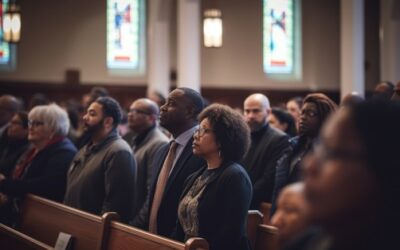The secret rapture belief asserts that the followers of Jesus will be suddenly and stealthily “raptured” from earth and taken to heaven. Then, any people left on earth will face a period of great difficulty—before Christ’s second coming actually happens.
But the Seventh-day Adventist Church believes that the second coming of Jesus will be a globally-witnessed event (Revelation 1:7), and that the followers of Jesus will be taken to heaven during that event (1 Thessalonians 4:14–18). There will be nothing secret about this occasion.
Ever since the earliest days of the denomination, Adventists have been interested in what the Bible says about the return of Jesus. (After all, the Second Advent is what inspired part of our name.)
In fact, our faith community grew out of a collective conviction of many Christians to study their Bibles more deeply and to figure out if, when, and how Jesus Christ was to return.
So let’s look at the Bible verses that talk about the manner and timing of the second coming of Jesus and the events surrounding it. We’ll also look at how the belief of the secret rapture came about.
This post will cover:
- What the secret rapture is
- What the Bible says about the rapture and the Second Coming
- The biggest takeaway of all—Jesus will return, and He wants to save us
Let’s begin with the history and definition of the secret rapture belief.
What is the secret rapture?
 When used on its own, the word “rapture” just refers to the followers of Jesus being taken with Him to heaven. But the “secret rapture” is the belief that Christ will come for His believers in an event that only they are aware of. Meanwhile, those who still haven’t accepted Jesus will notice that many people have suddenly disappeared in the blink of an eye.
When used on its own, the word “rapture” just refers to the followers of Jesus being taken with Him to heaven. But the “secret rapture” is the belief that Christ will come for His believers in an event that only they are aware of. Meanwhile, those who still haven’t accepted Jesus will notice that many people have suddenly disappeared in the blink of an eye.
Most secret rapture supporters believe in the pre-tribulation rapture,1 so that’s what we’ll explore here.
This theory teaches that the righteous will be suddenly taken away to heaven before what is referred to as the “tribulation” period.
Those still on earth, now noticing that people around them have disappeared, will have to endure this seven-year tribulation.
The theory teaches that this time is an opportunity for the people left behind to repent and accept Jesus. Then, Jesus will return after this tribulation and bring all His new converts to join everyone else in heaven.
This belief in the secret rapture is common enough that young adult books and blockbuster movies have been based on it. (Ever heard of the Left Behind series?)
But despite the theory’s acceptance among modern theologians, the idea is fairly new.
It was in the 1800s that John Nelson Darby popularized this doctrine through his philosophy of dispensationalism.2 This involved a literalist approach to theology that also divided all of history into distinct eras, or “dispensations,” and that God dealt with each of them differently. They’d have different struggles, different tests, and different judgments.
Along with this was a literal interpretation of Israel as a nation, rather than seeing it as symbolic for the church of all believers.3
And where this relates to the secret rapture is when Darby theorized that the Old Testament prophecies have yet to be fulfilled for Israel (or those who do not accept that Christ was and is the Messiah)—and that fulfillment would culminate with the second coming of Christ.
But the current church of believers in Jesus would not be under that dispensation, and they already believe in Jesus, so Darby asserted that there must be a secret rapture for the true believers before the public rapture (the Second Coming) of those converted during the tribulation period.
The secret rapture idea didn’t spread widely until the 20th century, when it appeared in the Scofield Reference Bible.4 Because this Bible was so popular among the Christians of the time, the theory became widely accepted by many denominations.
To better understand this movement, let’s start by looking at how certain verses are interpreted.
There are several verses that speak of Jesus coming for the righteous like a “thief in the night,” such as:
- 1 Thessalonians 5:2: “For you yourselves are fully aware that the day of the Lord will come like a thief in the night” (ESV).
- Revelation 16:15: “Behold, I am coming like a thief! Blessed is the one who stays awake, keeping his garments on, that he may not go about naked and be seen exposed” (ESV).
- 1 Thessalonians 5:4: “But you, brothers and sisters, are not in the dark, for this day to surprise you like a thief” (CSB).
- Luke 12:39-40: “But know this: If the homeowner had known at what hour the thief was coming, he would not have let his house be broken into” (CSB).
But here’s one of the most commonly-referenced passages used in support of the secret rapture:
Then two men will be in the field; one will be taken and one left. Two women will be grinding at the mill; one will be taken and one left.
Therefore, stay awake, for you do not know on what day your Lord is coming. But know this, that if the master of the house had known in what part of the night the thief was coming, he would have stayed awake and would not have let his house be broken into.
Therefore you also must be ready, for the Son of Man is coming at an hour you do not expect (Matthew 24:40–44, ESV).
Dispensationalists take these verses to mean that Jesus will rapture His followers from the earth while everyone else won’t even know what happened until it’s too late. That’s how they see the fate of the workers left behind in the field or at the mill.
A closer look at these passages
 Let’s start with Matthew 24:42–44.
Let’s start with Matthew 24:42–44.
The term “thief” is also used in several other verses about the end times (2 Peter 3:10; 1 Thessalonians 5:2). They all refer to how the timing of Jesus’ arrival at the Second Coming will be a surprise.
And because we never know when this day will happen, we should accept His gift of salvation and live out His gospel today (1 Thessalonians 5:4–6).
(Think of it like this: you can’t always know when a thief might come to your house, so you set up a security system and keep your home secure so that when it happens, you’re ready.)
But none of these verses indicate that Jesus’ arrival, or the rapture of believers, will go unnoticed. In fact, 2 Peter 3:10 states that His appearing will be such a powerful event that the sky will burn.
And revisiting Matthew 24:39–41:
“…and they were unaware until the flood came and swept them all away, so will be the coming of the Son of Man. Then two men will be in the field; one will be taken and one left. Two women will be grinding at the mill; one will be taken and the other left” (ESV).
All these verses are saying is that if you look at two random people out living life, they might appear similar, just going about their routines—but one was prepared for what was happening while the other one was caught by surprise.
But there isn’t any mention of life on earth continuing on after one person is taken and the other left. This whole section of Matthew 24 is talking about the “day of the Lord,” or the Second Coming. So both the taking and the leaving are happening at the time of Jesus’ return.
Now let’s look at other parts of Scripture that talk about the Second Coming, and how and when God’s followers will be taken to heaven with Jesus.
What does the Bible say about the rapture?
The Bible states that Jesus will come to earth to rapture the righteous in a literal, worldwide event.
The Second Coming goes by many different names, like the “coming of the Son of Man,” the “end of the world,” and “the day of the Lord.” It refers to the time when Jesus will appear to the world and call all His followers to join Him in heaven and receive the gift of eternal life.
The first resurrection (of the “dead in Christ”) will also happen at this time (1 Thessalonians 4:16).
Are the rapture and the Second Coming two separate events?
This is the primary difference between those who believe in the secret rapture and those who don’t. It’s not an issue of if the Second Coming and the rapture will happen at all, but if they happen at the same time or not.
The Bible describes the rapture as part of what happens at the Second Coming. They are part of the same event.
“For the Lord Himself will come down from heaven, with a loud command, with the voice of the archangel and with the trumpet call of God, and the dead in Christ will rise first.
After that, we who are still alive and are left will be caught up together with them in the clouds to meet the Lord in the air. And so we will be with the Lord forever” (1 Thessalonians 4:16–17, NKJV).
The word “rapture” isn’t found in Scripture, although it means “the act of carrying off.”5 But Christians started using the term because they felt it was a fitting way to describe how the righteous will be “carried off” to heaven.
And the definition is indeed fitting. But there’s no indication that this rapture would be secret.
Instead, when believers who are still alive are raptured, four things will happen:
1. Everyone on earth will see Jesus make an entrance (Revelation 1:7).
2. Believers who have died will be resurrected, transformed, and raised to meet Jesus in the air (1 Thessalonians 4:16).
3. Believers who are still alive at this time will also be transformed to have perfect physical bodies that never grow old or die (1 Corinthians 15:52).
4. All believers will meet Jesus in the air, where He will take them to heaven for the Millennium (1 Thessalonians 4:17).
What about the Great Tribulation?
 According to the Bible, believers will not be raptured before the tribulation. Instead, the Bible expresses a post-tribulation view—the concept that the righteous will be raptured after the tribulation, at the same time as the Second Coming.
According to the Bible, believers will not be raptured before the tribulation. Instead, the Bible expresses a post-tribulation view—the concept that the righteous will be raptured after the tribulation, at the same time as the Second Coming.
Most secret rapture supporters believe that the righteous will be raptured before the tribulation in order for God to protect His people from harm. But the Bible teaches that while the righteous will indeed be protected, they will still have to endure hardship (1 Peter 5:10).
Adventists believe that the righteous will have to go through the tribulation of the earth’s final days. Many examples in Scripture point to this idea, but one of the most powerful examples is the verse that says the tribulation will be shortened for the sake of the righteous (Matthew 24:21–22).
Why would the time be shortened for the righteous if the righteous won’t even experience it?
This suggests that the righteous will in fact be present on the earth during the “time of trouble.”
What’s more, those verses also undermine the idea that the tribulation will last for a set amount of time—seven years.
Dispensationalists actually take this interpretation from the 70 weeks prophecy in Daniel 9:24–27.6
This prophecy was stating how much time Israel as a nation would have to accept Jesus.7 Since the Bible translates a prophetic day as one year (Ezekiel 4:6), the Jews had 490 years to accept Jesus before God rejected them as His chosen people.8
All this means is that they would no longer be the primary nation to present the gospel message to the world. Instead, anyone who accepted Christ would be given that opportunity.9
In the final 70th week, the Bible says that Jesus was to cause the sacrificial practice—or the killing of lambs as an atonement for sin—to end because He paid the ultimate sacrifice (Daniel 9:27).10
After that, the last 3 ½ prophetic days (3 ½ literal years) of the 70th week would pass, ending at ad 34 when Stephen was martyred by the Jews (Acts 8:4).11
The fact that the Jews brought about the first early-church Christian martyr signaled the end of ancient Israel being God’s chosen people.
Dispensationalists believe that the 70th week (and if a week is 7 prophetic days, it would be seven years) did not occur at the end of Jesus’ ministry on earth. Rather, they say that this event refers to an event in the distant future. They believe this time is the great tribulation where instead of Jesus ending the sacrificial system with His perfect sacrifice, the antichrist will end the sanctuary system after 3 ½ years.12
But the Bible never mentions the 70-week prophecy or the 70th week in connection with last-day events. And it doesn’t specifically mention a seven-year-long tribulation that ends with the second coming of Christ.
As a matter of fact, just as we don’t know the day of Jesus’ arrival, we don’t know how long the tribulation lasts. We only know that it lasts for a very short period of time, since the world will be in such a volatile state. But we do know that much of this tribulation involves persecution (Matthew 24:9-14).
But even amid persecution, God will protect us and strengthen us, and we will be kept safe from the destruction of the last days. We’re even told that God will shelter us from the final plagues sent on the earth (Revelation 16, Psalm 91:5-7), just as He sheltered the Israelites during the plagues in Egypt (Exodus 11:7).
The Bible often compares the last days of the earth to the days of Noah. And when we think about the story of Noah, we realize that when God sent the flood, He did not entirely remove Noah from the situation. Instead, He provided a way for Noah’s protection amid the destruction. God promises to do the same for us!
We don’t have to worry about the end times because even though we’ll still be on earth during the “time of trouble” described in Daniel 12:1, we have the reassurance that God will sustain us.
The biggest takeaway of all—Jesus is coming back for us!
 God wants us to be prepared for Jesus’ coming—and to have every possible opportunity to make an informed decision about the allegiance of our hearts. But when Jesus returns in a glorious, worldwide event and takes the righteous with Him to heaven, everyone on earth will be settled in their decisions (Revelation 22:11).
God wants us to be prepared for Jesus’ coming—and to have every possible opportunity to make an informed decision about the allegiance of our hearts. But when Jesus returns in a glorious, worldwide event and takes the righteous with Him to heaven, everyone on earth will be settled in their decisions (Revelation 22:11).
God doesn’t want us to be afraid or caught off guard by that event. That’s why He invites us today to faithfully follow Him, trusting that He will strengthen us and care for us.
Then we can anticipate the incredible, indescribable joy the Second Coming will bring.
So even if you’re still figuring out what you believe about the end times and the Second Coming, one thing you can be sure of is that God loves every single person who has ever lived. And He has promised to come back for His followers, ready to welcome them into heaven with open arms.
Just keep studying your Bible, and the Holy Spirit will “guide you into all the truth” (John 16:13, NKJV).
Want to keep learning about the end times? We have pages about the Second Coming, heaven, the new earth, and the conflict between good and evil in our world.
- Pfandl, Gerhard, “The Rapture—Why it Cannot Occur Before the Second Coming,” https://www.adventistbiblicalresearch.org/wp-content/uploads/Rapture.pdf. [↵]
- Ibid. [↵]
- Ibid. [↵]
- Ibid. [↵]
- “Rapture,” https://www.etymonline.com/word/rapture. [↵]
- Crews, Joe, “The Secret Rapture,” https://www.amazingfacts.org/media-library/book/e/74/t/the-secret-rapture#Will-Christ-Return-in-Two-Phases-. [↵]
- Ibid. [↵]
- Ibid. [↵]
- Ibid. [↵]
- Ibid. [↵]
- Ibid. [↵]
- Ibid. [↵]
Related Articles
More Answers
What is the Concept of “Present Truth” and Why is it Important?
Present truth is the principle that certain biblical truths are relevant to God’s people at specific times in history. God sends the Holy Spirit to reveal truths that help us better understand how to interpret and apply His Word in a present moment.
What Does the Bible Say About Modesty
The Bible teaches that modesty, a form of humility and respect, is a valuable quality in everyone—men, women and children. It has to do with how we present ourselves, which should exemplify our inner relationship with God.
13th Sabbath Offering: What It Is and Why It Matters
On the last Sabbath of every quarter, Adventist churches participate in the 13th Sabbath offering—a special offering that goes to mission fields around the world.
Adventist Movies: Where Faith and Film Meet
The Seventh-day Adventist Church’s mission from the beginning has been to share God’s truth in the Bible. And as times have changed, we’ve explored new ways of doing this—one of those being movies.
Everything You Need to Know About an Adventist Church Potluck
Every so often, usually on a schedule ranging from once a week to once a month to once a quarter, an Adventist church will have “fellowship dinners,” often casually referred to as potlucks.
How to Join the Seventh-day Adventist Church
Whether you heard about the Seventh-day Adventist Church through a traveling evangelist, during your online searches, or through a loved one or relative, you might be considering joining yourself.
How Do Adventists Make Movie and Music Choices?
We have entertainment at our fingertips. With just a tap on our smartphones, we can access all the latest movies, music, YouTube videos, and more.
Do Adventists Celebrate Birthdays?
Yes, most Seventh-day Adventists do celebrate birthdays because we see them as excellent reminders of the life God has blessed us with. And we celebrate them the same way everyone else does—with friends, family, presents, and a special meal.
Are Seventh-day Adventists Christians?
Yes, the Seventh-day Adventist Church is a Protestant Christian denomination formed in 1863. Just like other Christians, we believe that Jesus Christ is our Savior and seek to follow the principles of the Word of God.
The Seventh-day Adventist Hymnal
The Seventh-day Adventist Hymnal is a songbook used worldwide by many Adventist congregations during their worship services. Since its publication in 1985, it has helped foster praise to God while reminding church members of our mission and drawing them closer to Jesus.
Do Adventists Have Their Own Bible?
Adventists have some unique beliefs—you might be able to name some of them right now. The seventh-day Sabbath. Death as a sleep. Hell as nonexistence.
Do Adventists Celebrate Communion and Foot Washing?
Like many Christian denominations, Adventists regularly participate in communion, also referred to as the “Lord’s Supper” or the “Last Supper.” They also practice foot washing (John 13:1-20), or the “ordinance of humility,” during the service—which isn’t as common.
How do Adventists choose what to eat?
Every day, parents go through the ritual of getting their kids to eat what is healthy and good while trying to steer them away from what can hinder the growth of their developing bodies. Nutritionists work with their clients to make better food choices.
What Are Seventh-Day Adventist Sermons Like?
In nearly every Seventh-day Adventist Church, the sermon is the focal point of the main service—similar to many Protestant Christian denominations. It is a time of biblical instruction by the pastor, who shares what they’ve been studying in the Bible and preparing over the previous week.
Didn’t find your answer? Ask us!
We understand your concern of having questions but not knowing who to ask—we’ve felt it ourselves. When you’re ready to learn more about Adventists, send us a question! We know a thing or two about Adventists.
















